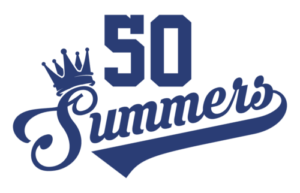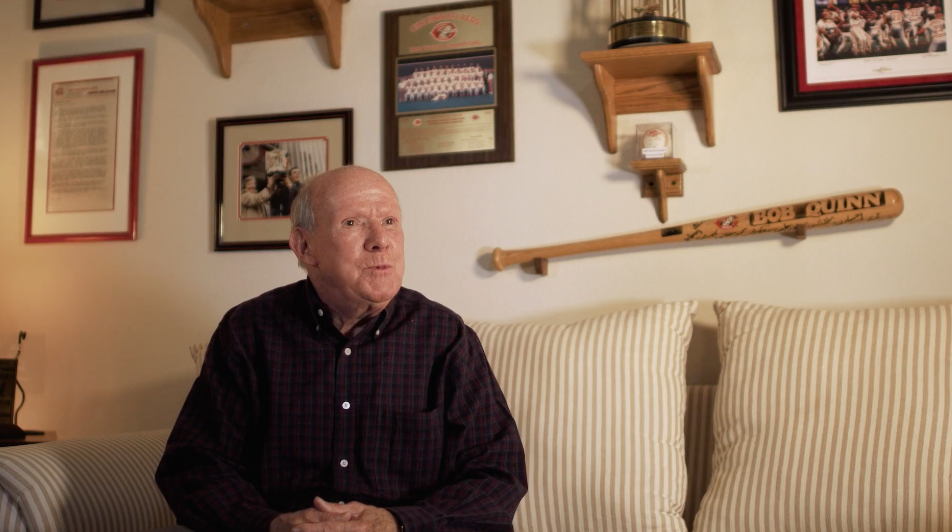Bob Quinn oversaw some of the most well-known Major League franchises and players in his 40-year career as a baseball executive. He worked under infamous owners George Steinbrenner and Marge Schott; orchestrated the 1990 Cincinnati Reds World Series run; and even signed Barry Bonds to a then-record contract with the San Francisco Giants in 1992.
But don’t let his MLB resume fool you — Quinn credits his success to his start in the minors. His grandfather (J.A. Robert Quinn) and father (John J. Quinn) made it clear to him that the path to the pros began in the ticket offices, concessions stands and stadiums of Minor League Baseball.
Quinn, who is featured in 50 Summers, recently sat down with Hurrdat Films to talk about his family, career, and his time in the minor leagues, which includes a stop in Omaha as the first GM of the Royals. The following is a transcript of an interview by Hurrdat Films with Bob Quinn. Parts of the transcript have been edited for brevity and clarity.
HF: So Bob, you’re a third-generation American baseball legend. Can you tell me a bit about your family’s long, intertwined history of baseball?
BQ: Well, it started with my grandfather J.A. Bob Quinn, who at age 16 became a groundskeeper for the Columbus Senators baseball club in Columbus, Ohio, and worked his way up from being a groundskeeper to where he eventually became president of the Columbus Senators and then went on from there to generally manage for different major league clubs. Ultimately, he became the first curator of the Hall of Fame in Cooperstown, New York.
HF: Wow, he really climbed the ladder then.
BQ: Yes, and when you stop and consider that he had limited education, he made the most of his “get up and go,” if you will. His intensity to want to succeed is legendary. And the fact that he became the first curator of the Hall of Fame is unto itself a tremendous accomplishment.
HF: As I was doing some research into your family’s baseball history, I kept thinking there must be some personality commonalities between your grandfather, your father, and yourself to all have chosen the same career path. Would you agree with that?
BQ: Yes… It’s interesting. Dad was raised on it. My dad, John J. Quinn, worked his way up. His first assignment was to work for the Hartford Chiefs, which was a Triple-A affiliate club for the Boston Braves. And then after having served there for several years, he moved into the minor league department of the Braves. Eventually, as grandpa Quinn got older, dad was being groomed and became general manager of the Boston Braves, ultimately the Milwaukee Braves. And then his final 13 years were as general manager of the Philadelphia Phillies.
While Grandpa Quinn never won a World Series ring, dad did win one in 1957 or ’58. I believe it was ’57 because they played the Yankees again in ’58 and had a 3-1 game lead, needed one more victory, and lost three straight and broke my dad’s heart. But my brother and I were always going down to the Braves field, taking the trolley and getting off. Mostly, they were day games — night games were just starting to be played — but my brother and I hung out at the old Braves field in Boston every summer.
HF: Is it safe to say that a lot was learned from just growing up and being around it?
BQ: No question. My brother and I learned how to read the ticker tapes so we could keep track of dad’s farm teams way back when the Boston and Milwaukee Braves had as many as 15 farm teams. Now, the average is five. Times have changed, and obviously, scouting has refined the system of selecting players that you think might ultimately play in the big leagues.
HF: What’s your earliest memory surrounding baseball, and why do you think it’s stuck with you?
BQ: We had a two-story home, and my dad would be conducting conversations with contemporaries in the baseball industry [on the ground floor]. My brother and I used to love to put our ears to the floor when we were seven and eight years old to listen to what dad was trying to accomplish. We thought that was special to be in the know early. So, I’m guessing ages seven and eight is when we really got hooked, and as I said, we would take the bus to the old Braves field so we could see all of the games during the summer season.
HF: So, you graduated from Marquette University in 1958, that’s correct, right?
BQ: That’s correct. I graduated — when the Boston Braves moved to Milwaukee in late ’53, I finished one year of high school at Marquette University High School and then went onto Marquette University. Neither of those institutions had a baseball program, so I ran track in my senior year of high school and then for four years in college and was co-captain of the track team. I ran the 100, 220, and 440. That way [to help my parents] I got a scholarship and paid my way through college.
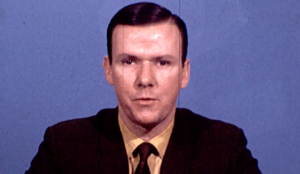
Bob Quinn served as a general manager for the Omaha Royals from 1969-1970, helping lead them to two division championships.
HF: Unsurprisingly though, you chose to start your career with minor league baseball with the Braves and the Phillies organization?
BQ: My dad gave us three choices: The first two didn’t count. He said, “I am not giving either one of you guys a job in the big leagues. If you want to earn your spurs, you go down in the minor leagues and learn from the bottom up. You hire the cashiers, the ticket sellers, the ticket takers, you rectify your financial statements. Every night you learn the business from the ground up.” So, Eau Claire, Wisconsin was my first stop in’59.
HF: What would you say was the most valuable lesson you learned during those first few jobs?
BQ: Be a people person. Treat everybody with the respect you would want them to treat you [with]. I learned early on that the baseball business, like most every business in life, is the people business, and you never should be too proud to jump in and assist where needed. I guess the most valuable lesson was that, as Barbra Streisand put it, people who need people are the luckiest people in the world. I just enjoyed every stop and all of the wonderful people that I met along the way.
HF: After getting some experience under your belt, you went on to help establish the Reading Fightin’ Phils organization and won Sporting News Minor League Executive of the Year in your first year as general manager. Do you think these early accomplishments set the tone for the rest of your career?
BQ: Hopefully. Dad’s mantra with all five of us, when he would leave for work every day was, “be the best.” And I was bound and determined that I was not going to live up to my dad’s code strings, but rather I needed to create some self-identity. The best way to do that is to be the best at what you’re doing. I was obviously very pleased when the Sporting News selected me as Double-A General Manager of the Year, a tremendous honor. Particularly in light of the fact that at that time, I believe there were three Double-A leagues. So, yes, Dad ingrained in each one of us that we should try to be the very best at whatever we took on.
HF: Well, your success certainly caught the attention of Minor League Baseball folks back in the Midwest. In 1959, you were recruited to help reestablish the Omaha Royals. Although your time spent with the Royals was limited, you accomplished a lot. What about the Omaha Royals and the atmosphere surrounding the team made it go from a rebuild to a booming success?
BQ: Oh, that was a fun challenge because Omaha had been absent professional baseball for about 12 years, so it was in the full sense of the word — a startup. That meant, you just started from scratch, and you had to get out in the community and sell the Royals who were at that time, the first Triple-A club of the Kansas City Royals. Lo and behold, thanks to manager Jack McKeon and then my assistant Bill Beck, we won the championship back to back in the first two years of operation.
HF: Obviously, this was enough to get the people of Omaha excited about baseball again, right?
BQ: Yes. It’s so heartwarming to know that professional baseball continues to flourish in Omaha. The Royals are really a landmark now. The fans really continued to support their Omaha club which does my heart good.
HF: From the Royals, you went on to work with major league teams of the Brewers and the Cleveland Indians, and later became the general manager of the New York Yankees, Cincinnati Reds, and the San Francisco Giants. During your time with the Reds, you’re credited with putting together the 1990 World Championship team, which is one of the best teams in the last 50 years. How did being a part of minor league baseball prepare you to succeed and excel in the major league?
BQ: I think the appreciation of the skill level of the players themselves. The 1990 Reds were magical in that as indicated, [they’re] now the only club in the last 38 years or beyond to go wire to wire. That club was never out of first place from opening day to the end of the season and then lo and behold, we sweep the A’s four straight. […]. Our starting pitching of Rijo and Browning, Scott Scudder won 10 games as a rookie, as did Jack Armstrong, who won 12 and was the starting pitcher in the All-Star game that year.
Everything fell together and then of course, in my opinion, and I think it’s now shared; our bullpen in Cincinnati was the forerunner of today’s use of the bullpen by all major league clubs. We had the Nasty Boys out of the bullpen. We had Rob Dibble, Norm Charlton, and Randy Myers, and Lou Piniella. [They] just knew when and how to bring it to the game. Lou used to tell me if we got the lead in the sixth inning, “The party is over because we have the three Nasty Boys out of the bullpen.”
That was a magical year. It hasn’t been replicated or duplicated. We take pride in that. I know when I went back from my last reunion there in Cincinnati, big Dibble put his arm around me and said on behalf of the players, “Mr. Quinn, we got to tell you, that was a masterful job of five trades that worked and resulted in our winning of the world championship,” which coming from a player, meant a great deal to me.
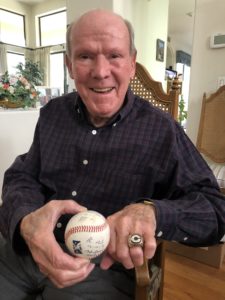
During his time as general manager for the Cincinnati Reds, Quinn helped the team win the 1990 World Championship.
HF: I’m getting goosebumps just listening to it. You have a great way of recalling that.
BQ: They are special memories because here’s my grandfather 60 years [old], four different major league clubs and never won, say, a ring, et cetera. So, I guess it’s extra special if you’re the third-generation and you recognize how difficult it is to be affiliated with and/or be part of building a championship team.
HF: Moving along down the timeline, as general manager for the Giants you signed Barry Bonds and the two of you formed a very close friendship in the years you were working together. Can you talk more about how Barry was in private versus his public persona? Because I know his character is often debated in the media.
BQ: Absolutely. Peter Magowan found me. I don’t know how he found me. I had been out of baseball a little bit. And he sat me down at the hotel […] and said the first thing we’ve got to do is sign Barry Bonds to a contract, and I said, “You’re talking about multimillion dollars to sign Bonds,” and he just looked at me and said, “You let me worry about the finances. We want you to put the club together.”
So, we sign Barry Bonds, and then Bonds and I became very close. I knew of his father who was a very outstanding player in his own right, but Barry was just so extra special in so many ways. He took great pride in keeping himself in great physical condition including the off-season where he had certain programs that he followed.
One of which blew me away. People may not be able to relate, but he had a program where he had a miniature baseball bat and had his dad or some family member throw ping pong balls up to him, so he could create the hand-eye coordination that became his calling card in the big leagues. He hit all of those home runs, but he went the extra mile, and I was blown away to watch him carry out that program of using a small miniature bat to hit ping pong balls consecutively. So, his hand-eye was not given, he worked on it.
HF: It sounds like it. Wow, that’s absolutely incredible…
BQ: Anything and everything negative about Barry Bonds is total hearsay. He couldn’t have been nicer. I never knew him to blow anybody off or be rude in any way, shape, or form with me. We’re still wonderful friends when we bump into one another at a baseball function. It’s a special treat for both of us.
HF: Well, I’m sure a lot of people will trust your opinion and take your word on that as well. As you said earlier, you had to make a name for yourself and work to get to a level that wasn’t just handed to you. How did it feel once you knew that you had fulfilled this legacy that both your grandfather and father had done as well?
BQ: Well, without trying to be braggadocious in any way, all I really wanted to do was be better than my grandfather and my father. In order to do that, I served my minor league apprenticeship, and then finally got to the big leagues, and then my peers were kind enough to vote me Major League Executive of the Year in 1990, when of course, the Reds went all the way and did all of those great things.
But, that’s an achievement that neither Grandpa nor Dad was able to acquire. So, I’m blessed that they put the carrot out there and said, “Can you top this?” And in a way, yes. But it all originated from dad’s insistence that we (my brother and I) learned the business from the ground up.
HF: I know that your son also followed in the family’s baseball footsteps as the executive VP of finance administration with the Milwaukee Brewers until early 2018. What’s the possibility of a fifth-generation clan continuing the legacy?
BQ: Well, I’m hoping that that will be the case, because my son Mike — who is been in the secret service for 30 plus years — has four sons […] So, I’m hopeful that with one of his four sons, we’ve got a pretty good chance […] that one or two of them will be elected to give professional baseball a career look.
HF: Do you always try to persuade them when you get together?
BQ: Yes. Baseball — the only thing that’s ever talked about, and of course, I’ve lived alone for the past 10 years but when I do catch up with family which is at least once or twice a year, if you can’t talk baseball, you might as well leave the room.
HF: I love it. So, you attended the 50th game of the Omaha Storm Chasers 50th season and threw the first pitch was fellow associates Jack McKeon and Bill Beck. How did it feel to be back where it all began?
BQ: Well, it was a thrill. Really, it was. The fans couldn’t have been nicer. The event was really nice — it was professionally prepared, and they treated us like royalty. It was a thrill getting to see Jack McKeon and Bill Beck who, when we parted and left Omaha, all three of us were able to obtain major league status, including Jack going on and being the manager of the year in Florida. At any rate, he had a very successful major league managerial career and brought Bill Beck with him […] So, we all looked back and said that it all started here in Omaha.
HF: As told in 50 Summers, minor league baseball has been through some major ups, downs and in between in the last 50 years. How does the league differ from when you were first involved with it?
BQ: Well, of course, the consolidation of the minor league systems for each Major League team would be an indicator that the player selection process I would say is becoming much more vital. It was vital when I ran around drafting high school and college players for Milwaukee and then 13 years with Cleveland and so on.
But the scouting profession has become much, much more vital to the point where you practically have to know everything about the player on and off the field before you recommend the player for the draft. So, the scouting profession has become not only increasingly vital but continues to be the reason that professional baseball flourishes.
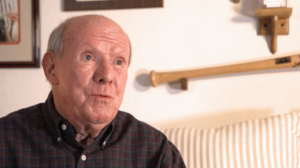
Quinn is a third-generation baseball legacy. His grandfather J.A. Robert Quinn owned the Boston Red Sox and Boston Braves, and his father John J. Quinn was GM of the Major League teams in Boston, Milwaukee and Philadelphia.
HF: That’s a nice perspective there. You may have hung up your general manager title a while ago, but I have a hard time believing someone as involved with baseball as you could completely step away from the game. As you probably know, the two biggest free agents right now Bryce Harper and Manny Machado aren’t signed yet. If you were a general manager today, who would you sign, Harper or Machado?
BQ: If I had a choice, I’d sign them both. If I had the resources, I’d sign both. They’re two of the most outstanding free agent players that’ve come along. I can’t remember when two players of their stature and abilities have been on the free agent market. Both of them are going to make major contributions and both of them are future hall of famers. It’s sad but often times, it’s the team with the greatest financial resources that has the inside track. But basically, money talks, and I would expect that both Harper and Machado were going to end up with humungous contracts at some point in time before spring training begins.
HF: Do you have any final words, thoughts, or pieces of advice as you reflect back on your impressive career?
BQ: It was a blast. I harken back to the fact that I did it the right way thanks to my dad and that serving an apprenticeship in the minor leagues made me, I think, appreciate my big-league jobs just that much more. As a result, I ran spring training for the Giants four years after I retired because they knew I had run Minor League clubs and asked me to do so.
Putting that all aside, I have no regrets. I paid my dues, had a great time doing it, and then ultimately, the topper, of course, was the wire to wire and sweep [of the] World’s Championship with the Reds in 1990.
